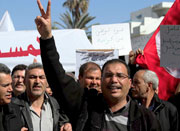 Economic grievances figured prominently in the Tunisian uprising. But a year after the toppling of the Ben Ali regime, the rallying cry for “jobs and social justice” continues during the strikes that are now a daily occurrence, particularly in the less endowed regions of the country. Despite a plea by the newly-elected president for a six-month moratorium, the strikes continue unabated and threaten to further weaken an already fragile economy.
Economic grievances figured prominently in the Tunisian uprising. But a year after the toppling of the Ben Ali regime, the rallying cry for “jobs and social justice” continues during the strikes that are now a daily occurrence, particularly in the less endowed regions of the country. Despite a plea by the newly-elected president for a six-month moratorium, the strikes continue unabated and threaten to further weaken an already fragile economy.
Key Conclusions
Tunisia’s economy is stagnated as a result of the uprising. Output has dropped (the mining sector has contracted by as much as 94 percent); tourism has slowed down dramatically; and unemployment has rapidly increased. These pressures are putting the gains from the revolution at risk.
Yet, in many ways, Tunisia is poised for a successful post-uprising transition. A well-educated workforce and an increasingly vibrant civil society could help it turn the corner, both politically and economically, and attain some of the hopes and dreams for which many valiantly fought for during the uprising.
Analysis
Recent studies estimated that in 2011, the GDP in Tunisia hovered around zero growth, with an occasional dip into negative numbers. This has led some commentators to state alarmingly that 2011 “will figure in history as the worst economic and social times in six decades.” According to a recent study, strikes and job actions in 2011 accounted for the loss of over 300,000 work days, paralyzed the industrial sector, and caused the closure of many businesses and the loss of thousands of jobs. The mining sector was the hardest hit. It decreased over 90 percent. Unemployment, especially among the young and educated, had reached over 18 percent by the end of 2011, culminating in early 2012 to close to 800,000.
Despite valiant efforts, the government, which is the biggest employer in the country, has created only a limited number of jobs, and the private sector is still too weak to alleviate the situation. Foreign direct investment, one of the largest sources of external financing, has fallen by twenty percent, and more than 150 foreign ventures have left the country.
The uprising and its turbulent aftermath has also affected tourism, which was one of the largest sources of foreign currency and provided tens of thousands of jobs. Tunisian officials have attempted to be optimistic by saying that, because of the revolution, their country has received an enormous amount of free publicity, but tourists have not returned to fill the empty hotels.
There are also additional external factors that have hurt Tunisia financially during 2011. The conflict in Libya has had a very negative effect. Libya, where tens of thousands of Tunisians worked, was an important source of income for Tunisia in the form of trade, investment, remittances, and tourism. According to one estimate, the income received from Libya amounted to $2.5 billion a year, or five percent of the Tunisian GDP. Libyan refugees have been an additional burden and strain on resources during the height of the conflict, although the well-to-do among them occupied many of the vacant hotels and made up for some losses in tourism. Another major factor has been the global economic crisis, and particularly the sovereign debt crisis gripping many countries of the European Union (EU). The EU is Tunisia’s main economic partner; 80 percent of its trade is with that economic bloc.
Clearly, the biggest challenge for Tunisia is economics. The success of the transition could depend on how fast jobs can be created and sustained. The current situation may be delicate but not catastrophic. The economy did not collapse. In fact, if one looks at the GDP growth by quarters, what affected the overall figure for 2011 was the initial setback during the early months of the year, when the country was paralyzed by protests, both legal and illegal. After this turbulent period, the economy actually grew somewhat. Also, there has been no inflation, despite the fall in foreign currency reserves.
With an elected government now in place, the worst of the instability seems to be ebbing. The new executive is sparing no effort to restore confidence and earn the support of the public and external partners, despite some internal contradictions and missteps. Some of these partners have signed development and investment agreements with the current government. Given the high capacity of Tunisia’s workforce and an engaged civil society, there is hope that Tunisia, despite the uncertainties that lie ahead, will be able to achieve the political and economic turnaround it needs.
Youssef Mahmoud is a Senior Adviser at the International Peace Institute.
Jose Vericat is an Adviser at the International Peace Institute.
About the photo: A demonstration in support of the General Union of Tunisian Workers (UGTT) in Sousse, Tunisia, March 3, 2012.




